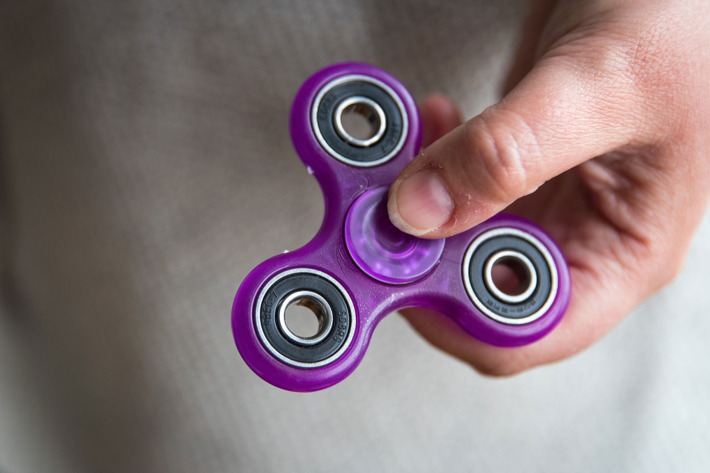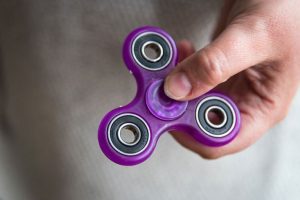
Picture this: you are sitting in a movie theater on the edge of your seat. Dramatic music plays, and the movie, “Titanic”, is coming to an end.
“Don’t let go.”

“I’ll never let go, Jack. I’ll never let go. I promise.”
Silence.
“Whooooosshh” Some kid ruins the mood with his fidget spinner! I would assume by now you’ve heard about these new “helpful” toys. Most fidget spinners have three wings connected by a bearing in the center. One can use them by holding the center bearing with their thumb and index finger, and spinning the wings with their ring finger or other hand.
So are these new fidget toys helping kids focus of are they just frustrating and others? Some people argue that though they may help some kids, they are too distracting to other kids. In fact, CBS News found that 32% of the USA’s largest 200 schools have banned fidget spinners. Some say that the fidget spinners distract other students, and even the teachers. Plus, some people are extremely annoyed by them. Blackhawk Middle School banned fidget spinners in April 2017, frustrating many. But to some people, it is a relief.
Justin Hoering, a teacher at BMS, says, “I think that they are appropriate for people who need them, but most people just use them as a toy, as a distraction from what they should be doing.” One can only imagine what it would be like to be trying to tech a group of students all playing with toys, claiming that its helping them focus. To teachers, they are more of a distraction, a toy, and a waste of money than a tool that helps them.
However, to some people, fidget spinners are a life saving device! If the students know how to use it without making a big deal about it, it can really help.
Sydney Spilker, an eighth grader at BMS, says, “I’ve always had trouble focusing and sitting still. When they released these new toys that were supposed to help with ADHD, ADD, anxiety, autism, and stress, I was one of the first to get one, and it really helped, too. But the problem is, some people just use it as a toy and ruined it for everyone. I’m really upset that we had to go as far as banning them, because it really helps some people, including myself, and now it’s against the rules.” From a student’s point of view, the spinners are helpful and beneficial.
Miriam Gwynne, the mother of an eight year old with autism, wrote on her blog, AutismAwareness.com, “For [my daughter] the fidget spinner is not a must-have craze to be like her friends, but more a stress release from the demands placed upon her during her school day — much the same as she uses a stress ball or her twist-and-lock blocks. When schools decide to ban sensory and fidget toys, they risk isolating the very children they’ve spent years trying to include.”
After her sons school banned the fidget spinners, one mom told the Manchester Evening News, “At first I thought it was brilliant that other kids had them because he wouldn’t have to answer any questions or feel awkward using it, but now that they’re being banned in schools, it means he will have to lose an aid that is extremely beneficial to him.”
“I’m really glad that the school banned the toys.” Says Jason Hoering, “While they did help a few students, the majority of the kids that had them were constantly distracted by them. I was even a little distracted by them.”
There are many different things to consider before banning or not banning fidget spinners. Most teachers view them as a distraction, while students think that they are helpful.
So what do you think about the fidget spinners? Are they spinning up a storm or stimulating studies?
You decide.
This sheds new insight on the fidget spinner.
Good job showing both sides. I honestly can’t decide which one I’m on!
I thought you had a great lead, I only looked at your title and I was already hocked. But while I was reading your post I saw a few spelling errors, but overall nice job.
I liked how you used your quotes and facts!